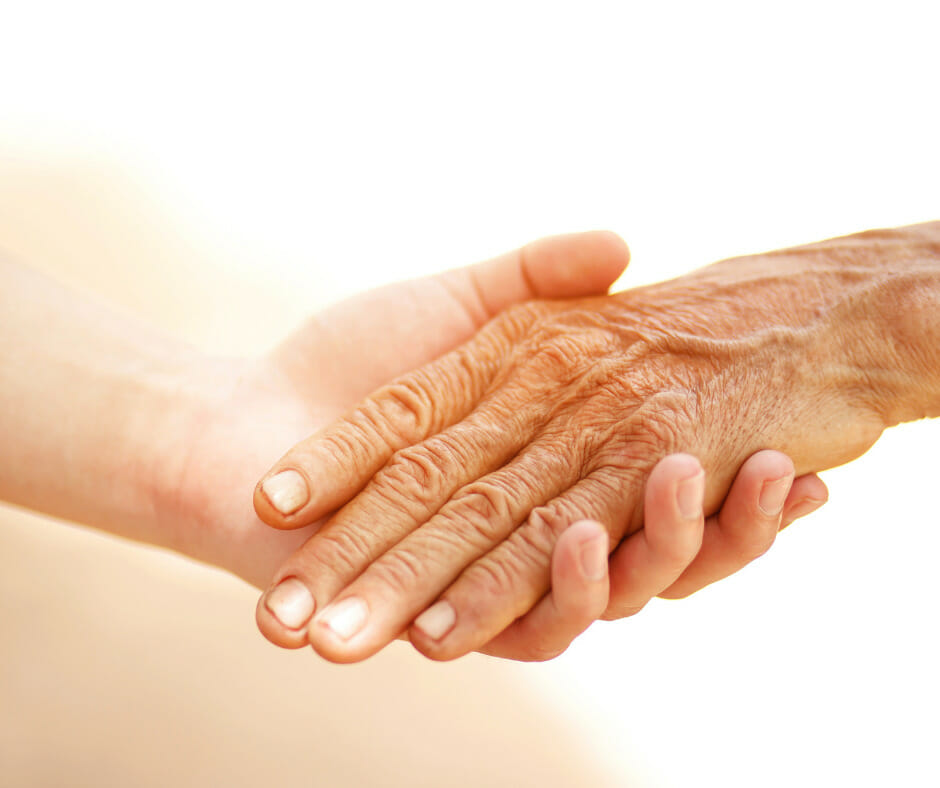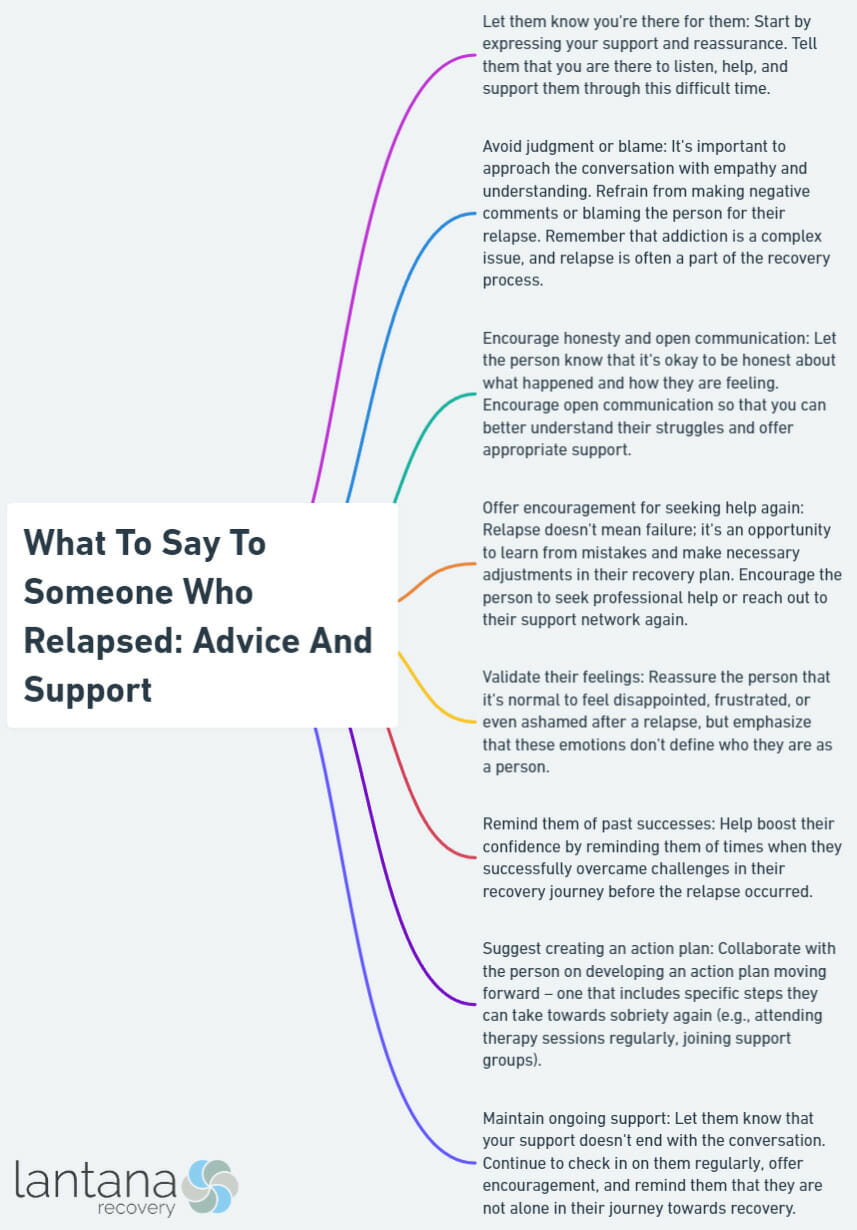Relapse is a challenge that many people face during their recovery journey. As a friend or family member, it can be difficult to know what to say or do when a loved one relapses. The purpose of this blog post is to offer advice and support for those who find themselves in this situation, specifically addressing “what to say to someone who relapsed”. By understanding the nature of addiction as a chronic disease and recognizing that relapse is a part of the recovery process, we can provide compassionate communication and practical guidance to help our loved ones get back on track.
In this blog post, we will discuss the importance of empathy, offering support without enabling, maintaining healthy boundaries, and connecting with resources and support systems, all while keeping in mind what to say to someone who relapsed. Our aim is to empower you in your role as a support system for your loved one and provide guidance on how to best assist them in their recovery journey.
Key Takeaways
- Offer compassionate communication, open conversation and understanding to those who have relapsed.
- Reinforce their strengths and encourage professional help in order to support them on their recovery journey.
- Maintain healthy boundaries while connecting with resources for long term sobriety.
Understanding Relapse: A Part of the Recovery Journey

Addiction, being a chronic disease, often involves addiction relapse as part of the recovery process for drug abuse. Hence, focusing on finding the right treatment is vital. Perceiving relapse not as a failure, but as a chance for growth and learning, aids in addressing it effectively. When a relapse occurs, it can be a critical turning point in a person’s recovery journey.
Friends and family members should tackle the situation with empathy and understanding, steering clear of criticism or accusations. Remember, the person who has relapsed is likely experiencing intense feelings of guilt, shame, and disappointment. By offering support and acknowledging their struggle, we can help them see the relapse as a learning experience and encourage them to move forward in their recovery journey.
Offering Compassionate Communication

Engaging in conversation with someone who has relapsed necessitates communication that is empathetic, understanding, and free from judgment or blame. Remember that addiction is a medical condition that alters the brain’s functioning, and it is natural for a person to face challenges during the recovery process. By offering emotional support and understanding, we can help the person feel less alone and more motivated to seek the treatment they need.
Using “I” statements and avoiding accusatory language can help prevent the person from feeling defensive or ashamed. Encourage open conversation by asking if they are ready to discuss their relapse and gently let them know that you are available whenever they wish to talk. One should concentrate on their feelings and recognize their struggle without inducing feelings of guilt or shame.
Encouraging Open Conversation
A safe and non-judgmental environment is pivotal in promoting open dialogue about the relapse experience. By exhibiting understanding and compassion, abstaining from blame and shame, and listening without prejudice, we can help the person feel comfortable discussing their relapse.
It is also crucial to respect their boundaries and not force them to talk about their relapse if they are not ready. By offering a safe space for open conversation, we can help them reflect on the experience and encourage them to learn from it, ultimately promoting growth and progress in their recovery journey.
Acknowledging Their Feelings
Offering support during a relapse involves:
- Validating the person’s emotions
- Acknowledging their struggle
- Letting them know that it is completely natural to feel disappointed, angry, or upset after a relapse
- Reassuring them that these feelings do not define their progress in recovery.
By expressing understanding and assuring them that it is common to experience difficulties in the addiction recovery process, we can help them feel heard and supported, allowing them to face the challenges of substance abuse and substance use disorder with renewed motivation and resilience.
Avoiding Blame and Shame
While engaging in communication with a person who has relapsed, one should:
- Sidestep language that could induce feelings of guilt or shame
- Augment their sense of shame can exacerbate their feelings of guilt
- Hinder their willingness to seek professional help and support
Instead, focus on offering encouragement, understanding, and support. Remind your loved ones of how far they have come in their recovery journey. It is important to stress that a relapse is not a failure, but simply a setback that can be overcome with the help of experts at an institution like Lantana Recovery.
Supporting Their Next Steps

Assisting someone to progress after a relapse requires providing practical advice and support to help them regain control of their recovery journey. Encourage them to reflect on the experience and learn from it, as this can be a valuable opportunity for growth and progress.
Offer assistance in identifying potential triggers, reinforcing their strengths, and seeking professional help. By providing support and guidance, we can help our loved ones overcome the challenges of relapse and continue moving forward in their recovery journey.
Reinforcing Their Strengths
Supporting someone who has relapsed could involve:
- Reminding them of their past successes
- Emphasizing their potential to surmount challenging situations
- Recalling their prior accomplishments
- Emphasizing their resilience
- Bringing about a sense of optimism and confidence in their ability to achieve long-term sobriety
Encourage them to focus on their strengths and remind them that they have the tools and resources to overcome this relapse and continue on their path to recovery. This can provide them with the motivation and determination needed to face the challenges ahead as they try not to relapse.
Encouraging Professional Help
Post-relapse, it is crucial to seek treatment from professional help as a key step towards maintaining long-term sobriety and regaining control of the recovery process. This may involve:
- Returning to previous services
- Initiating a new course of action, such as attending professional addiction treatment and in-person support groups
- Utilizing online support options, including professional treatment resources
Encourage the person to seek professional help by expressing your willingness to be involved in their recovery process and offering assistance in finding appropriate treatment options. By doing so, we can help them access the resources and support they need to overcome the challenges of relapse and continue their recovery journey.
Assisting in Identifying Triggers

Part of supporting someone’s recovery journey involves aiding them in identifying potential triggers and crafting effective strategies to manage them. To identify potential triggers, encourage the person to be mindful of their emotional responses to different situations and consider seeking professional help from a psychotherapist or counselor at an institution like Lantana. Offer assistance in developing strategies for managing triggers, such as:
- Formulating a plan for how to respond
- Utilizing mindfulness and relaxation techniques
- Obtaining support from friends and family
- Seeking professional help from a therapist or counselor
As stated in a study by Garland and Howard in 2018, over the last ten years, researchers have looked into mindfulness-based approaches (MBIs) as a way to treat various addictive behaviors, including drinking, smoking, misusing opioids, and using illicit drugs such as cocaine and heroin. By helping them address and manage triggers, we can empower them to regain control of their recovery and prevent future relapses.
Maintaining Healthy Boundaries

When supporting a loved one who has relapsed due to alcohol abuse, the establishment and maintenance of healthy boundaries are integral to protecting both oneself and the person in recovery. Boundaries clarify what enabling behaviors are and how to abstain from them when providing support.
By setting and upholding healthy boundaries, we can ensure that we are offering the best possible support to our loved ones while also prioritizing our own well-being. This can help create a supportive and nurturing environment that fosters growth and progress in their recovery journey.
Prioritizing Self-Care
While extending support to a loved one during their relapse, taking care of oneself is critical for the well-being of both oneself and the person in recovery. By dedicating time to self-care, we can:
- Reduce stress and anxiety
- Improve our own mental and emotional well-being
- Maintain our own physical health
- Set a positive example for the person we are supporting
Taking care of ourselves is not selfish, but rather necessary for us to be able to provide the best support possible.
Some ways to prioritize self-care include dedicating time for relaxation, being compassionate to yourself, eating healthily, taking breaks, and connecting with supportive friends and family members. Remember that taking care of both you and your family members is not selfish – it is a necessary part of providing the best possible support.
Avoiding Enabling Behaviors
Enabling behaviors, which can involuntarily perpetuate active addiction, involves protecting an individual with addiction from the consequences of their actions. To avoid enabling behaviors, it is important to establish clear boundaries and communicate which behaviors are acceptable and which are not.
When supporting someone in recovery, it is essential to remain consistent in upholding these boundaries and to refuse to give in to requests for assistance that are not in the best interest of the person being supported. By doing so, we can provide the necessary support while also promoting accountability and responsibility in their recovery journey.
Connecting with Resources and Support Systems

There are various resources and support systems available for both the person who has relapsed and their loved ones, such as support groups, addiction treatment centers, and online forums. These resources can provide valuable assistance and guidance throughout the recovery process, helping both the person in recovery and their support circle navigate the challenges of relapse and maintain long-term sobriety. For instance, “structured psychological treatments like cognitive therapy offer hope in battling depression’s relapse, proving effective beyond initial treatment” (How does cognitive therapy prevent depressive relapse, Teasdale et al., 1995.) To tap into these resources, one should concentrate on:
- Fortifying relationships with family and friends
- Participating in a support group or support groups
- Leveraging technology to connect with people undergoing similar experiences
By connecting with resources and building a strong support system, we can empower ourselves and our loved ones to continue moving forward in their recovery journey.

The Bottom Line
In conclusion, learning about relapse and its risk factors and then supporting a loved one who has relapsed can be a challenging and emotional experience. By understanding the nature of addiction as a chronic disease, offering compassionate communication, providing practical guidance, maintaining healthy boundaries, and connecting with resources and support systems, we can help our loved ones overcome the challenges of relapse and continue on their path to recovery.
Remember that relapse is not a failure, but an opportunity for growth and learning. By offering our support, understanding, and encouragement, we can empower our loved ones to regain control of their recovery journey and achieve long-term sobriety.
Frequently Asked Questions
What do you say to a client who has relapsed?
You can say something along the lines of: “I understand how difficult this is for you. Let’s work together to figure out what went wrong and create a plan to help you stay on track” or “You are not alone in this, and we will get through it together.”
What’s the best thing to do after a relapse?
After a relapse, reach out for help to process what happened and gain insight to avoid further relapses. There is no shame in asking for help, and it will benefit you in the long run.
How do you help a client who has relapsed?
Validate your client’s feelings, ask more about what it feels like to have relapsed, and share observations across those you’ve helped. Reassure your client that these emotions and doubts are normal.
What do you do when your friend relapses?
Stay connected with your friend after relapse and express optimism about their ability to get back on track. Showing them that you believe they can change will motivate them to keep going.
How can I help someone identify potential triggers for relapse?
Help the person recognize potential triggers for relapse by being mindful of their emotional responses to different situations, and suggest seeking professional help from a psychotherapist or counselor. This can help them identify and address any underlying issues that may be causing them to relapse, and develop strategies to cope with difficult situations.









